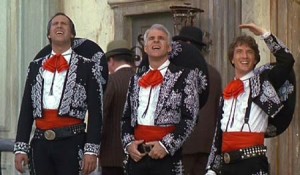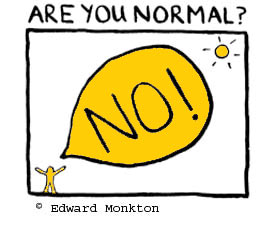 A hot day in a small, rural village. Three riders approach bearing news that a gang of thieves and marauders are quickly approaching. These riders, these… three amigos have pledged to help the townsfolk defend themselves.
A hot day in a small, rural village. Three riders approach bearing news that a gang of thieves and marauders are quickly approaching. These riders, these… three amigos have pledged to help the townsfolk defend themselves.
“What is it you do really well?” asks one of the riders.
“Hmmm.” The people look around at their peaceful farm community.
“We can sew!” one shouts.
Ah. Fantastic. The bandits won’t stand a chance. Well now, don’t you worry, the three amigos and the villagers did in fact figure out a solution. By sewing hundreds of costumes, they dressed the entire village up to look like the three heroes and thus defeated the gang through confusion, intimidation and surprise. Whew.
The poignant lesson from this otherwise very silly movie “The Three Amigos” is that effective work happens when you draw on people’s strengths. If you inherit a sizeable piece of land and a herd of cattle, you’d be better off going into the dairy business rather than trying to build a nuclear power plant. If you teach at an outdoor science school and “inherit” a group of kids whose abilities don’t match up to your usual management and teaching style, you need to adjust your goals and desired outcomes.
Unfortunately, most of us are stuck in a cultural view of what is normal and what is not. The fact that the word “disability” is still in common use suggests that we believe some humans are less able than others.
 I recently had the opportunity to teach and observe a group of children, which included four deaf and hard of hearing (DHH) students. Having no experience with DHH kids, I immediately saw them as a potential impediment that might hold our group back. However, after watching them cruising around our outdoor classroom and talking with their teacher, I realized that the problem was mine; I wanted those kids to conform to my vision of normal.
I recently had the opportunity to teach and observe a group of children, which included four deaf and hard of hearing (DHH) students. Having no experience with DHH kids, I immediately saw them as a potential impediment that might hold our group back. However, after watching them cruising around our outdoor classroom and talking with their teacher, I realized that the problem was mine; I wanted those kids to conform to my vision of normal.
My normal way of teaching didn’t ask me to look deeper for what these kids were really good at. They have had just as much life experience as any other fifth grader and undoubtedly have skills the others lack. Turns out that among them were such assets as more complex emotional perception and very strong affinities with their non-auditory senses.
Largely due to this experience, I believe that moving towards more integrated classrooms is a good idea. To keep certain groups of children cordoned off from mainstream classes denies students and teachers the opportunity to work with a more diverse set of abilities and worldviews.
In every successful system, be it environmental or economic, the strength lies in the checks and balances offered by differentiated elements.

A forest with a multitude of plant and animal species is unlikely to be destroyed by a parasite or a disease, because harmful forces don’t have the ability to attack every type of organism. Diverse life forms cooperate to become stronger than they would be on their own – fungal systems help tree roots gather more soil nutrients in exchange for carbohydrates; remora fish clean the parasites off sharks and turtles and get a tasty meal in return.
Empathy and compassion don’t need to be the driving reasons to welcome more diverse classrooms, because functionality and productivity are perhaps more compelling.
Every child has a unique and valuable set of skills; and every child can be an asset to their learning community if we can discard what we think is normal and practice strength based educational management.
 At High Trails Outdoor Science School, we literally force our instructors to write about elementary outdoor education, teaching outside, learning outside, our dirty classroom (the forest…gosh), environmental science, outdoor science, and all other tree hugging student and kid loving things that keep us engaged, passionate, driven, loving our job, digging our life, and spreading the word to anyone whose attention we can hold for long enough to actually make it through reading this entire sentence. Whew…. www.dirtyclassroom.com
At High Trails Outdoor Science School, we literally force our instructors to write about elementary outdoor education, teaching outside, learning outside, our dirty classroom (the forest…gosh), environmental science, outdoor science, and all other tree hugging student and kid loving things that keep us engaged, passionate, driven, loving our job, digging our life, and spreading the word to anyone whose attention we can hold for long enough to actually make it through reading this entire sentence. Whew…. www.dirtyclassroom.com

Comments are closed.